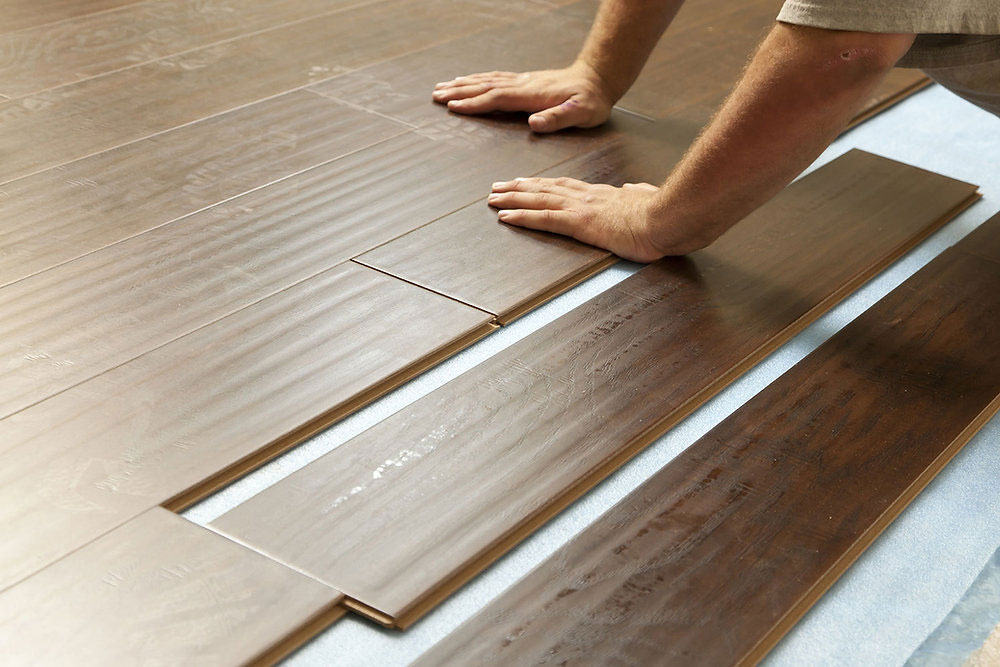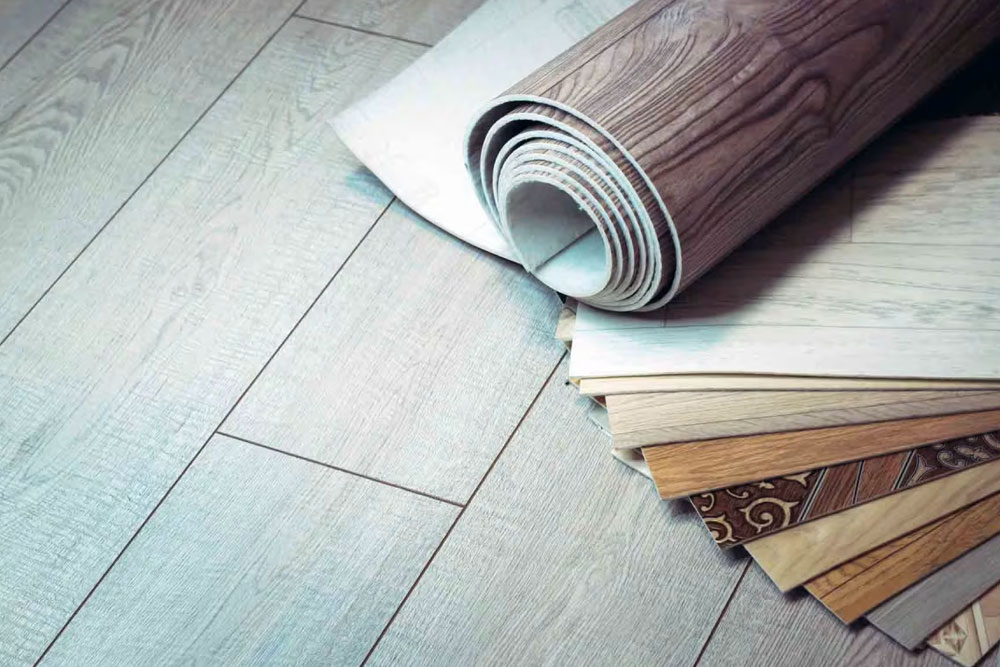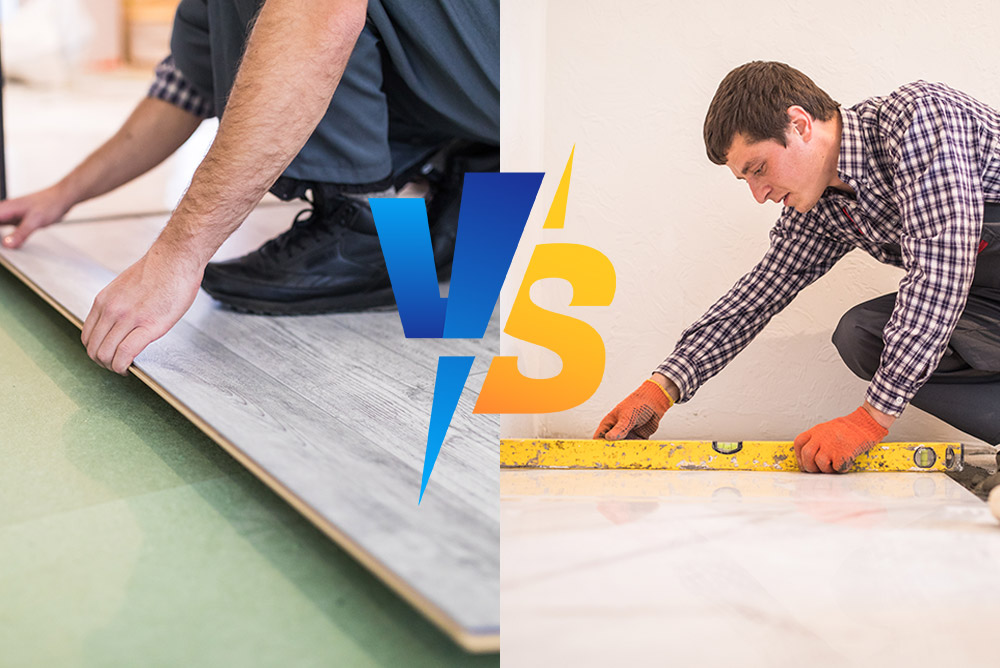Choosing the right flooring for your home isn’t just about looks but also about comfort, durability, budget, and peace of mind. In a place like the UAE, where heat and humidity can take a toll on your interiors, picking a floor that lasts and looks good matters more than ever.
If you’re caught between vinyl vs linoleum, you’re not the only one.
Many homeowners face the same decision, wondering which is truly worth the investment. Both have their strengths, but they serve different lifestyles and spaces.
In this blog, we’ll break down every angle, durability, design, maintenance, and more, so you know exactly what fits your home and lifestyle. Whether you’re renovating or choosing flooring for a new place, this guide will help you make the best choice without second-guessing.
What Is Vinyl Flooring?
Vinyl flooring is a highly durable, synthetic flooring material made primarily from polyvinyl chloride (PVC). It comes in multiple layers, including a wear layer, a printed design layer, and a backing layer, all designed to provide strength, water resistance, and a realistic appearance.
Popular types of vinyl include:
- Vinyl Sheet– rolled out in large sheets, great for bathrooms and kitchens where seamless coverage helps prevent moisture seepage.
- Vinyl tiles – modular and easy to replace if damaged.
- Luxury vinyl planks (LVP) – offer a wood or stone appearance, often with embossed textures for added realism.
Its ability to mimic natural materials like oak, marble, or slate makes vinyl a top choice for UAE homes, especially in high-traffic or high-moisture areas.
(Also Read: Benefits of Vinyl Flooring for Your Dubai Home Renovation)
What Is Linoleum Flooring?
Linoleum is a time-tested, natural flooring option made from renewable resources like linseed oil, cork dust, wood flour, and natural pigments. It has a soft matte finish and is known for its flexibility, resilience, and eco-friendliness.
Linoleum comes in sheets, tiles, or click panels, and though its color options are more subdued compared to vinyl, they’re infused throughout the material (not printed on top), meaning scratches are less visible.
It’s naturally antimicrobial and biodegradable, an ideal solution for environmentally conscious homeowners who don’t want to compromise on performance.

Material Comparison
When comparing linoleum flooring vs vinyl, one major difference lies in their composition. Linoleum is all-natural, making it a safer and greener option. It’s also less prone to chemical off-gassing and more sustainable long-term.
Vinyl, on the other hand, is fully synthetic, which gives it excellent resistance to water and stains. However, it may emit volatile organic compounds (VOCs), especially if not certified as low-emission. If eco-friendliness is your top priority, linoleum takes the lead. If durability and moisture resistance matter more, vinyl wins.
Which Lasts Longer?
If we’re talking pure lifespan, linoleum often outlasts vinyl. With proper care, linoleum flooring can last up to 40 years or more. It’s tough, naturally anti-static, and resists wear over time.
Vinyl flooring, depending on the quality and type, typically lasts between 10 to 20 years. However, it requires less maintenance and holds up better in wet environments. For high-humidity areas like bathrooms or laundry rooms, vinyl’s water resistance is a big advantage.
(Verdict: Linoleum may last longer overall, but vinyl is more resistant to moisture and daily spills.)
Which Looks Better in Modern Homes?
When it comes to aesthetics, vinyl offers more variety and visual appeal. It’s manufactured to mimic everything from hardwood to stone, often with high-definition printing and textured surfaces.
Linoleum tends to have a softer, more matte look. It comes in muted tones and is available in sheets or tiles with fewer high-gloss options. If you’re going for a bold or realistic floor look, vinyl flooring gives you more options.
(Verdict: For modern, stylish, or high-gloss finishes, vinyl often looks better. For a softer, eco-conscious aesthetic, linoleum is a beautiful alternative.)
Comfort and Feel Underfoot
In day-to-day living, comfort matters. Linoleum is slightly softer and warmer underfoot, especially when installed over proper underlayment. It’s also quieter, which makes it a good choice for bedrooms or home offices.
Vinyl can feel a bit harder and colder unless it’s padded or installed with cushioning layers. But modern vinyl flooring has improved, especially luxury vinyl planks, which offer better underfoot comfort.
Which is Easier To Install?
When it comes to installation, sheet vinyl has a clear edge, especially for DIY enthusiasts. It’s more flexible, easier to cut, and doesn’t require heat treatments or complicated adhesives. Many homeowners in the UAE choose sheet vinyl for quick renovations in bathrooms or kitchens because it can be laid directly over existing floors with minimal tools.
Linoleum vs sheet vinyl installation differs quite a bit in complexity. Linoleum needs more precision and skill. It often requires professional-grade adhesives, and if seams are involved, they must be welded properly to avoid moisture seepage. Improper installation can lead to warping or lifting, especially in humid conditions like those found in coastal areas of the UAE.
If you’re planning a renovation and want lasting, seamless results, professional help is strongly recommended, especially for linoleum. Even with vinyl, choosing experienced vinyl flooring installation services can make a huge difference in finish quality and durability.
Maintenance and Cleaning
Vinyl takes the lead when it comes to everyday maintenance. It’s resistant to stains, water, scratches, and dust, making it ideal for busy households or rental properties in Dubai. All it needs is regular sweeping and occasional mopping with mild detergent. No need for polishing, sealing, or special cleaning agents. It’s a practical choice for families, pet owners, or anyone who values low-maintenance living.
Linoleum, on the other hand, requires a bit more attention. While it’s naturally durable, it’s also more sensitive to moisture and needs to be sealed periodically to stay protected. Harsh chemical cleaners can damage its surface, so gentle products are recommended. Spills should be cleaned promptly to prevent staining or water absorption.
(Verdict: Vinyl offers effortless care with minimal upkeep. Linoleum demands more maintenance but can last decades if properly looked after.)
Water Resistance and Heat Tolerance
Vinyl is completely waterproof, which makes it ideal for moisture-prone areas like bathrooms, kitchens, laundry rooms, and even basements. It can handle everyday spills, wet shoes, and steam without damage. In UAE homes, where humidity and water usage are high, vinyl stands up well, especially in villas with outdoor access or rental units near the coast.
Linoleum is only water-resistant, not waterproof. If exposed to standing water for too long, it can absorb moisture, leading to swelling or warping. In addition, linoleum tends to yellow over time with direct sun exposure, a common concern in homes with large windows or balconies unless a UV-protective finish is applied.
(Verdict: For the UAE’s hot, humid environment, vinyl is the safer bet. Linoleum works better in dry, shaded indoor spaces where water contact is minimal.)
Health and Eco-Friendliness
If you’re environmentally conscious or sensitive to indoor air quality, linoleum stands out. It’s made from natural materials like linseed oil, cork dust, and wood flour, making it biodegradable and low in toxins. It doesn’t emit harmful fumes, which is ideal for allergy sufferers or homes with kids and pets.
Vinyl, on the other hand, is synthetic and may contain chemicals like phthalates. However, many modern vinyl flooring options now come in low-VOC or phthalate-free versions for safer indoor use.
(Verdict: For eco-conscious homeowners or those with sensitivities, linoleum is the healthier, greener choice.)
Which Is More Budget-Friendly?
Vinyl flooring is typically more affordable upfront. Vinyl sheet is among the most budget-friendly options available, while luxury vinyl comes at a moderate cost depending on style and thickness.
Linoleum tends to be slightly more expensive in both materials and installation. However, its long lifespan can make it a better investment in the long run.
(Verdict: Vinyl wins for initial savings. Linoleum may offer better long-term value if durability is a priority.)

Where Should Each Flooring Type Be Used?
Choosing between linoleum vs sheet vinyl often comes down to where you plan to install it. Different spaces have different needs, especially when it comes to moisture, foot traffic, and design preferences. Here’s where each flooring type works best:
Vinyl is ideal for:
- Bathrooms
- Kitchens
- Laundry rooms
- Rental properties
Linoleum is ideal for:
- Living rooms
- Bedrooms
- Offices
- Homes focused on sustainability
If you’re comparing linoleum vs sheet vinyl, think about where it’s going and how much moisture or wear that space gets.
Vinyl vs Linoleum in UAE Homes
In Dubai and across the UAE, flooring must handle high temperatures, constant air conditioning, and occasional dust storms. Vinyl performs exceptionally well in these conditions—its waterproof surface and low-maintenance nature make it ideal for kitchens, bathrooms, and entryways.
Linoleum can also be a great choice, especially in well-ventilated, air-conditioned areas. However, it does require a bit more care to preserve its finish, particularly in humid or sun-exposed spaces.
(Tip: If you live in a villa or high-rise apartment, vinyl flooring installation is often the more practical choice for moisture-prone areas. Meanwhile, linoleum adds a warm, natural touch to bedrooms, home offices, or lounges.
Quick Summary: Vinyl vs Linoleum
Still deciding? Here’s a side-by-side comparison to help you quickly see how vinyl and linoleum stack up across the most important factors:
| Feature | Vinyl Flooring | Linoleum Flooring |
| Lifespan | 10–20 years | 20–40 years |
| Water Resistance | 100% Waterproof | Water-Resistant |
| Eco-Friendliness | Lower (synthetic materials) | Higher (natural and biodegradable) |
| Design Options | Wide variety of styles and textures | More limited, natural-looking designs |
| Cost | More budget-friendly | Slightly higher upfront |
| Comfort | Firm underfoot | Softer and more cushioned feel |
| Maintenance | Very low | Moderate (requires sealing) |
| Installation | Easier, DIY-friendly | Requires professional skill |
Final Verdict: Which Should You Choose?
Choosing between vinyl vs linoleum really comes down to your priorities. If you want something stylish, affordable, and easy to maintain, vinyl is a solid choice, especially for homes in humid areas like Dubai.
If you’re leaning towards sustainability, natural materials, and don’t mind a little extra care, linoleum flooring offers unmatched durability and eco-friendly benefits.
For most modern homes in the UAE, vinyl often takes the lead for its water resistance, design variety, and ease of installation.
Need Help With Vinyl Flooring Installation?
If you’ve decided that vinyl is right for your space, the next step is installation. A professional vinyl flooring installation ensures smooth finishing, proper fitting, and long-term durability, especially important in the UAE climate. Don’t risk gaps, bubbles, or peeling floors. Let experts handle it and enjoy peace of mind with a flawless finish.




